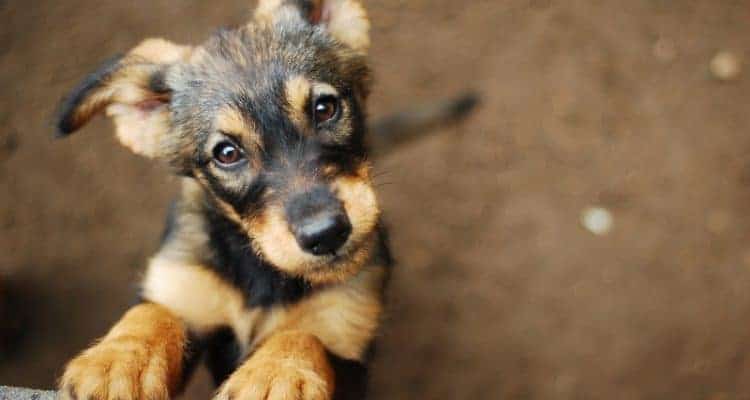Many people find worms in their animal water and food dishes, especially when these bowls are left outside after a warm rain.
While this is distressing, there is usually little reason for concern. Usually, these worms don’t come from your dog and aren’t a threat to your dog’s health. Your dog may have diarrhea or other mild symptoms if he eats them. So you want to prevent this from happening if possible.
Here, we’ll explain what these worms are, where they come from, how much of a threat to your dog’s health they may be, and what to do about them.
Why Are There Worms In My Dog’s Water Bowl?
If you see any worms in your dog’s drinking dish, you should dump the water and sanitize the bowl immediately. Consider placing the bowl inside a shelter with a doggy door if it must be kept outside. Sanitize any outdoor water or food bowl at least once a week, especially in warm, humid conditions.
Unless your dog’s face and mouth are so infested with worms that they are falling off of him like rain, chances are the worms in your dog’s bowl are coming from the environment. Of course, it is a very nasty thing to see worms writhing in your dog’s water or food dish. The biggest problem with this situation is the possibility that your dog will ingest them, which may or may not cause a health problem for your beloved doggo.
Small worms and their larvae may be present on your dog’s fur, especially if he spends a lot of time outdoors playing in the dirt and grass. If that’s the case, then the worms in both cases probably come from the same or similar outdoor source. If your dog is spending a lot of time outside getting dirty, you should give him a wash with the garden hose and a quick brush before letting him come back inside to vastly reduce the likelihood that you’ll see these same worms inside your home.
When it comes to the ones that seem to spontaneously appear in outdoor water dishes, they may be one of usually three types of worms. No matter what type they are, you should try to keep your dog from consuming them since diarrhea or mild intestinal distress may result. In some cases, potential health problems may be worse. So, prevention is your best bet, as always.

White Worms in Dog Water Bowl
White worms that are attracted to standing water are usually Gordian Worms. Gordian worms are parasitic creatures that live in insects and crustaceans primarily. They don’t normally live well on or inside your dog’s body, but you still don’t want your dog drinking them if possible since your dog could have a bad reaction to them.
The Gordian worm larvae tend to prefer to lay in wait on plants near an open water source. In these locations, they have a good chance of being ingested by crabs, bugs, and similar creatures. Once they are inside the desired host body, they will grow and trick their host into leaping into any available water- like your dog’s water bowl. Therefore, if you see dead insects in your dog’s water along with white worms, there’s a good chance that they are Gordian worms.
If your dog or cat ingests these worms, they will usually cause the animal to vomit, or they will pass in a subsequent bowel movement. They will usually not cause any serious harm, but they may cause discomfort. If you have an older dog or a dog with health issues, the presence of these worms may make things worse.
Black Worms in Dog Water Bowl

If you see little black worms in your dog’s outdoor water dish, it is probably mosquito or other insect larvae. Most of the time it will be mosquito larvae. Like the worm-like larvae of the Gordian worm, these are not generally going to pose a health risk to your dog if he happens to ingest them. As usual, this may not be the case if your dog is older or has health challenges.
However, mosquitoes are a health hazard to everyone once fully grown, active, and airborne. It is always a good idea to limit their breeding grounds, and standing water is their favorite place to lay their eggs. What’s more, if you see mosquito larvae in water wiggling in that particular way they do, it means that adult female mosquitoes will be hunting for blood. It is, in fact, only the adult female mosquito that sucks blood from larger creatures. When female mosquitos bite you, they then feed that blood to their worm-like babies. Adorable.
Mosquitoes can get through just about any barrier to access suitable standing water. So keeping your dog’s water bowl in a dog house with a doggy door won’t keep them out. Your best bet is to clean the dish regularly.
In most cases, mosquito larvae will not pose a major health threat to your animal. However, they are a source of heartworm infections that can clog the arteries of a dog’s heart and can therefore be very dangerous if gone untreated.
Symptoms of heartworm include:
- Shortness of breath
- Dry cough
- Weakness
- Loss of stamina
- Swelling in the limbs (edema)
- Fainting during activity
- Jaundice
- Anemia
Keeping your dog away from the sources of heartworm can be difficult to impossible, especially if he plays outdoors. Your best bet is vaccination and keeping your dog’s water dish clean.
Tiny Brown Worms in Water Bowl
If you see tiny brown worms in your dog’s water dish, don’t confuse them with mosquito larvae. While there are many types of worms that look brown and are likely to take up residence in your dog’s drinking water, the most dangerous among them is the roundworm.
The roundworm is well known for its tendency to infest the digestive systems of dogs and cats. They can cause a long list of unpleasant symptoms, and they can be difficult to get rid of without veterinary care. They are also very contagious. Puppies can get them from each other and from drinking the milk of their mother. Fortunately, because they are so common, most vets are well equipped to deal with these parasites.
The most common symptoms of roundworm infection include:
- Swollen abdomen
- Rapid weight loss
- Weakness
- Diarrhea
- Vomiting
- Coughing
- Worms in the vomit and stool
Most household pets that have access to the outdoors will contract roundworms at some point in their lives. Having them seen by a vet regularly and vaccinating them are good ways to reduce the chances of a grave illness. Most healthy animals will overcome a roundworm infection with medical help without much problem. However, for older animals and those with existing health conditions, the addition of a roundworm infection may prove to be too much.
Red Worms in Dog Water Bowl
Naturally, seeing red-colored worms in your dog’s dish can be a shock initially because red is the color of danger and fear. But most of the time, these are just a variation of normal flying incests that will drop their larvae into standing water, such as mosquitoes.
Most of the time, these pose little threat to your animal’s health and wellbeing. Of course, as mentioned above, with mosquito larvae comes the chance of heartworm, which is possibly the greatest health risk to domesticated dogs. Avoid this with regular checkups at your local veterinarian’s office.
Keep in mind that you are unlikely to keep your pets from ingesting materials that contain sources of heartworm and other common parasites, especially if they have access to the outdoors. In nearly every case, your pets should be regular visitors to your local vet, as this is the only way to be sure to keep heartworms from posing a danger to their health.
Finally, whether or not you do see worms in your pet’s outdoor water dishes, it’s a good idea to clean and sanitize these dishes at least once a week. Your dogs may be more resistant to outdoor germs than we might be, but it’s still the least we can do to keep their eating and drinking dishes reasonably clean.

